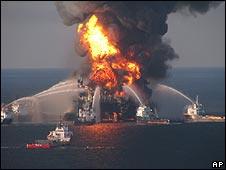Q&A: Deep-water drilling restrictions
- Published
The Deepwater Horizon oil disaster, which killed 11 workers and created a huge oil spill, has led to President Barack Obama announcing measures to restrict drilling in deep water.
As well as major changes to the Minerals Management Service which regulates the oil industry, Mr Obama announced changes to what offshore exploration would be allowed.

The oil disaster raises questions about how drilling should be regulated
Why is this so important?
The Gulf of Mexico spill has painfully highlighted how hard it is deal with major problems that take place so far beneath the surface of the sea.
In shallow waters, divers can attend to equipment on the seabed. In the case of the current spill, everything must be done by remote-operated vehicle.
The sheer depth of the site where the Deepwater Horizon was digging has contributed to the scale of one of the US's worst environmental disasters.
What is deep-water offshore drilling?
Not all offshore drilling is deep-water. The new measures classify anything beyond 500ft as deep water.
Previously, the authorities in the US classified anything under 1,000ft as shallow water, anything over 1,000ft but under 5,000ft as deep water and anything over 5,000ft as ultra-deep water.
How is it being restricted?
There are four main moves being indicated by President Obama. Firstly, there is a six-month moratorium on new deep-water drilling permits for oil and gas. The current exploratory drilling on 33 wells in the Gulf of Mexico will be suspended. Planned drilling in two locations off Alaska will also be suspended. A pending lease sale for the Gulf of Mexico and a planned one for Virginia will be cancelled.
In the case of the 33 suspended wells, drilling will not stop immediately. The crews will be able to continue until they are at a safe point in the drilling to suspend.
There will be tighter inspection and certification of blowout preventers - the device that should have stopped the Gulf of Mexico spill. Rig workers will be subject to improved safety and training programmes.
So will production be affected?
Not production that is already under way. The 591 oil and gas production wells in deep water and the 4,515 in shallow water will carry on producing.
But production that was forecast will be affected, with a possible impact on prices.
What has Obama's position been on deep-water drilling been?
It was only at the tail end of March that President Obama announced an expansion in what drilling would be allowed in deep-water areas.
Then he said: "My administration will consider potential new areas for development in the mid and south Atlantic and the Gulf of Mexico."
At the time there was opposition from environmentalists on the basis that deep-water drilling could lead to ecological disasters.
Now, President Obama says: "I continue to believe what I said at that time. Domestic oil production is an important part of our overall energy mix.
"Where I was wrong was in my belief that the oil companies had their act together when it came to worst case scenarios."
How much oil is in deep water?
As a percentage of both the US's oil production and reserves, it is a lot.
According to the US Energy Information Administration, deep-water and ultra-deep water drilling, just in the Gulf of Mexico, accounts for 23.5% of US oil production.
Of all the US reserves of oil, in 2008, 14.9% were in deep-water and ultra-deep water areas of the Gulf of Mexico. Both of these percentages are based on the 1000ft definition of deep water.
What are the wider implications?
For the supporters of increased oil production in the US or off its coasts, there is a simple argument - the more oil the US produces domestically, the less it has to buy from other countries.
They would argue that the US would be freer to take tough action against Middle Eastern producer nations or those closer to home, like Venezuela, if it was not "dependent" on their oil.
But Mr Obama, and others, have emphasised that a switch to renewables can also achieve the goal of reducing foreign oil consumption.
And as well as affecting where the US gets its oil and how much is paid, there will also be implications for jobs in states on the Gulf of Mexico.